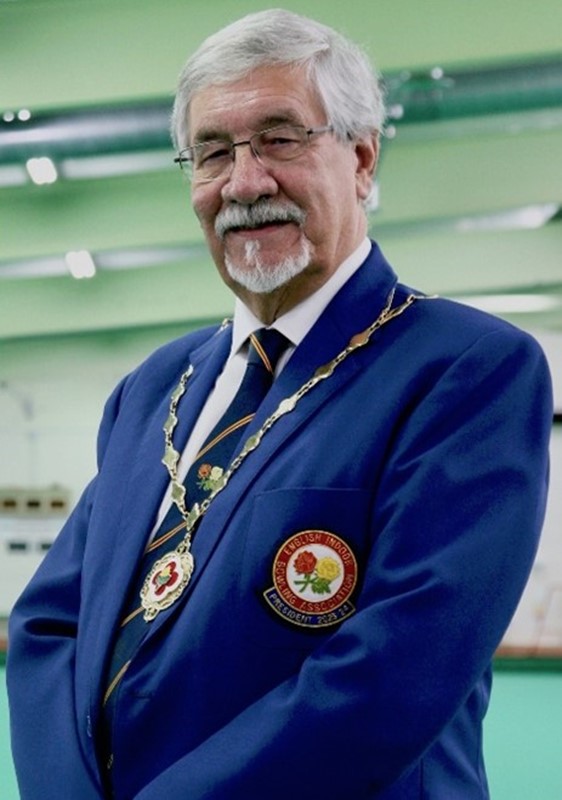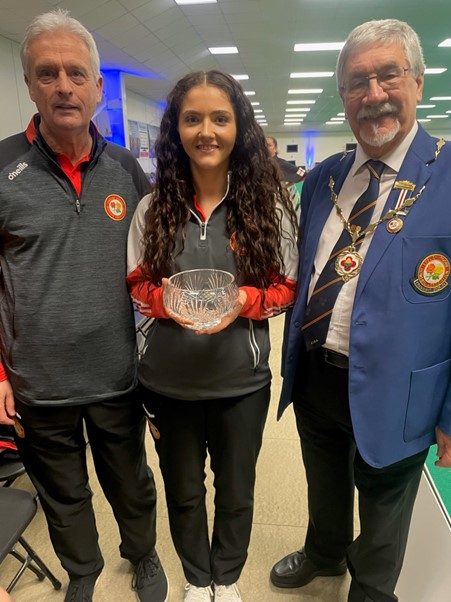 |
The EIBA is pleased to acknowledge the following Official Partners & Suppliers
|
2023/24 EIBA PRESIDENT STEVE BOUGHTON FOUND BOWLS AFTER INJURY FORCED HIM TO GIVE UP COMPETITIVE SQUASH |
|
When the other children in his street made the school football team,
he wanted in on the action. Then came rugby in the winter and tennis
in the summer. After leaving school, Steve played scrum half for Northampton Old Boys and High Wycombe before having to stop because of poor eyesight and played tennis for his local clubs, enjoying stints as captain. The first company he worked for had a squash court in the sports ground and Steve would later play in a national league. The achievements are remarkable because when Steve was born in 1943 his parents were told that he would never walk. "My left leg was seriously deformed," he explained, "The main problem was talipes (better known as a club foot), but I also had a shortage in the leg itself. "Thanks to the relentless persistence of my parents I had 23 operations at either Manfield Orthopaedic Hospital Northampton and Great Ormond Street Hospital, by the time I was 12 years old and they enabled me not only to walk, but to pursue sporting activities provided my left ankle was supported. "As the years passed the need for ankle support subsided, though my left ankle is still somewhat weak, my left foot is five shoe sizes shorter than my right foot and I have a half inch shortage in my left leg - causing strain in my lower back and some imbalance. "I would not presume to say that I achieved top standards in any of the sports I played, but had great pleasure from them." Steve says despite not reaching elite level himself, he was able to mix with sports stars. "In rugby I was trained by, or played with, several British Lions and England Internationals," he added. "In tennis I played with a Wimbledon player and in squash with an England trialist. Furthermore I worked for a couple of years with a Commonwealth Games athlete who was the first British female to run 800 metres in under two minutes. "What this has given me is an appreciation of the dedication and hard work needed to reach the top in any sport, together with a keen interest in the way top performers think about their sport." Bowls came into Steve's life at the age of 37 after he put his back out playing squash.  "After about six months the main-stream medical professionals told me that there was nothing they could do and I would have to live with the pain," he said. "A friend at work suggested that I should see his osteopath and he said that he could put me right, but on condition that I never played competitive squash again. There was no real option, but once the treatment was completed I became depressed and morbid. "When I was visiting my parents, my father took me to Northampton Indoor Club and I found that it was a game I could play. "Finding bowls did me a power of good - both physically and mentally. To start with, I again had a sport I could enjoy. Also, I found that everyone I met was very friendly. In squash I had entered the "veteran" category, but I would arrive at the bowls club and people would say"Here comes young Steve". You can imagine what that did for my ego!" In terms of highlights, Steve lists winning the club championships as an underdog and being selected for his first Liberty Trophy match. He said: "In 1995 I was invited to go on a tour to South Africa. About 70 of us from the Worcester area went for three weeks and played 13 matches in Durban and Cape Town. Apartheid had only recently ended and it was a real eye opener to see the country undergoing a difficult transition. "We played two matches in the South African city of Worcester, which in the wine growing area and is the home of the KWV brandy distillery. The local hospitality flowed very freely and I swear there were at least two jacks at the other end of the rink for both matches. Needless to say, we lost, but the experience was marvellous. "During the tour my wife, Carol, and I had a three day rest, so we hired a combi and went into a game reserve to explore the wildlife and Zulu culture. Other people on the tour thought we would never return, but that trip started a love of Africa in us both and we have since travelled extensively in sub-Saharan East Africa." The EIBA presidential term came about through former president Margaret Allen. Steve said: "I'd been playing both indoors and outdoors for Worcestershire for some time and thoroughly enjoyed those opportunities, so when I was approached to stand for the presidency of Worcestershire IBA I was happy to do so. My first term was 1997/8 and I have been President twice more since then in 2004/5 and 2014/15. That led on to being elected as President of the Midland Counties IBA in 2000/01 and again in 2015/16. "I had no notion of becoming involved with the EIBA until I went on a bowls tour to Cyprus and met Margaret who became a friend. She persuaded me that I should stand and people within Worcestershire and the wider Midland Counties were encouraging. Equally, if not more important, my wife Carol said that she would bear with the inevitable disruption to our married life, so I stood and was lucky enough to be elected as Junior Vice-President." For Steve there have been many standout moments. "I have always enjoyed seeing new places, meeting people and talking about their way of doing things, so going to different parts of the country for cresidential celebration games has been a delight," he said. "I have also always been fascinated to see how top level performers approach their particular sport, so having the opportunity to mix with the best in bowls has been both an honour and great pleasure. "I was able to receive the Gedling Trophy and the Hilton Trophy on behalf of the English teams and present the Family Pairs National Championship to Tom and Dan Holmes from my own Indoor Club which were brilliant moments." Having been involved in so many different sports, for so long, I'm interested in Steve's views about what more bowls can do to raise its profile. "I have been convinced for a long time that the sports that get national press and media coverage do better than those which do not," he said. "This can be seen at big multi-sport events when smaller sports get coverage and see a surge of interest and new membership. "In my opinion bowls suffers because it is too fragmented. Tennis, for instance, does not have separate national bodies for indoor and outdoor, so the LTA speaks for the whole game. We have separate national bodies for the different manifestations of our game and the result is that the voice of bowls is weakened. The problem, as I see it, is that each branch of bowls is organised very differently. I appreciate the reasons for this, but those very reasons make it almost impossible to speak with one voice. "I do not pretend to know what the answer is, but I do think that, without coverage, the vast majority of people will never appreciate the subtleties of the game and we will be stuck with the image of "old men's marbles" played only by people over a certain age. In my working life I sat on several joint industry working groups (particularly when the Financial Ombudsman Service was being created) and saw how solutions can be found to apparently insurmountable problems given good will and co-operation by the parties concerned. Perhaps something along these lines could be tried for bowls. "I know that this is not an original opinion and more knowledgeable people than me will say that it has been tried before. Indeed, some will say it is very radical, but lots of initiatives to promote our game have been tried in recent years and none have achieved a breakthrough. Perhaps some radical thinking is called for." Sian Honnor. We'd love to know what bowls means to you, get in touch at info@eiba.co.uk Previous Article - Interview with Jack Goodland |
June 2024
|
Archives |
Accessibility |
Downloads |
Guidance Notes |
Links |
Photos |
Contact Us |
Privacy Notice
|


-(003).png)








